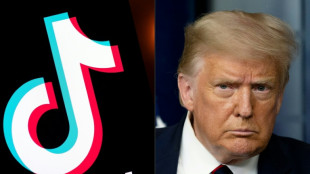-
 'Pretty crazy': Tien youngest since Nadal into Melbourne last 16
'Pretty crazy': Tien youngest since Nadal into Melbourne last 16
-
Noman and Sajid give Pakistan lead in spin-dominated first Test

-
 Russian attack kills three in Kyiv
Russian attack kills three in Kyiv
-
Sinner romps past Giron into Australian Open last 16

-
 Svitolina stuns Paolini for family fairytale at Australian Open
Svitolina stuns Paolini for family fairytale at Australian Open
-
Indian court finds man guilty in notorious hospital rape case

-
 Medvedev fined $76,000 for Australian Open antics
Medvedev fined $76,000 for Australian Open antics
-
S. Korea's president in court as investigators seek to extend detention

-
 Gaza ceasefire to begin Sunday morning, after Israeli approval
Gaza ceasefire to begin Sunday morning, after Israeli approval
-
Trump administration plans mass immigrant arrests next week: incoming official

-
 Russian attack kills four in Kyiv
Russian attack kills four in Kyiv
-
Monfils primed to do Australian Open 'damage' after 17-year first

-
 Teen qualifier Tien surges into Australian Open last 16
Teen qualifier Tien surges into Australian Open last 16
-
Sinclair, Warrican spin Pakistan to 230 all out in first Test

-
 'Lucky loser' Lys makes history to reach Australian Open last 16
'Lucky loser' Lys makes history to reach Australian Open last 16
-
South Korea's president in court as investigators seek to extend detention

-
 Swiatek destroys Raducanu, Monfils stuns Fritz at Australian Open
Swiatek destroys Raducanu, Monfils stuns Fritz at Australian Open
-
Veteran Monfils stuns fourth seed Fritz at Australian Open

-
 TikTok's journey from fun app to US security concern
TikTok's journey from fun app to US security concern
-
US TikTok ban looms as Trump seeks last-ditch solution

-
 Swiss Ruegg wins uphill finish to lead women's Tour Down Under
Swiss Ruegg wins uphill finish to lead women's Tour Down Under
-
Rybakina needs physio 'magic' after fighting on at Australian Open

-
 Swiatek destroys Raducanu as Sinner steps up Melbourne defence
Swiatek destroys Raducanu as Sinner steps up Melbourne defence
-
Impeached South Korean president arrives for arrest warrant hearing

-
 Irving shines as Mavs roll Thunder, Nuggets scorch Heat
Irving shines as Mavs roll Thunder, Nuggets scorch Heat
-
History-making 'lucky loser' Lys into Australian Open last 16

-
 Three-set specialist Navarro credits billionaire dad for stamina
Three-set specialist Navarro credits billionaire dad for stamina
-
Rampant Swiatek has ball 'listening' to her in rout of Raducanu

-
 Scratchy Navarro dumps Jabeur out of Australian Open
Scratchy Navarro dumps Jabeur out of Australian Open
-
In Brazil, disinformation deals Lula a bruising defeat

-
 South Korea court to decide on extending president's detention
South Korea court to decide on extending president's detention
-
Slew of satellite projects aims to head off future wildfires

-
 TikTok could 'go dark' in US Sunday after Supreme Court ruling
TikTok could 'go dark' in US Sunday after Supreme Court ruling
-
Brutal Swiatek routs Raducanu to reach Australian Open last-16

-
 Menendez brothers' hearing delayed by LA fires
Menendez brothers' hearing delayed by LA fires
-
Tsunami survivor Sasaki overcame tragedy to reach MLB

-
 'We're entertainers': Pegula backs Djokovic call to jazz up tennis
'We're entertainers': Pegula backs Djokovic call to jazz up tennis
-
Marathon man Draper warns Alcaraz he's in for a battle

-
 Israeli government approves Gaza ceasefire deal
Israeli government approves Gaza ceasefire deal
-
Hoffman, Hoey share PGA Tour lead in La Quinta

-
 Japanese star Sasaki announces joining LA Dodgers
Japanese star Sasaki announces joining LA Dodgers
-
39 dead in Colombia guerilla violence, govt suspends peace talks

-
 The video games bedeviling Elon Musk
The video games bedeviling Elon Musk
-
Gamers tear into Musk for 'faking' video game prowess

-
 Kvaratskhelia signs for Paris Saint-Germain from Napoli
Kvaratskhelia signs for Paris Saint-Germain from Napoli
-
US Treasury to take 'extraordinary measures' to avoid debt default

-
 Lille warm up for Liverpool clash by going third in Ligue 1, Monaco lose
Lille warm up for Liverpool clash by going third in Ligue 1, Monaco lose
-
Man Utd and Scotland great Denis Law dies aged 84

-
 Frankfurt heap more pain on Dortmund as Marmoush eyes Man City move
Frankfurt heap more pain on Dortmund as Marmoush eyes Man City move
-
Canada vows 'Trump tax' on US in response to tariffs: minister

Trump announces Homan as new 'border czar'
Thomas Douglas Homan: A Comprehensive Overview of His Career and Influence on U.S. Immigration Policy
Thomas Douglas Homan is a prominent American law enforcement official best known for his role as the Acting Director of U.S. Immigration and Customs Enforcement (ICE) from January 2017 to June 2018. His tenure coincided with a period of significant change in U.S. immigration policy under the Trump administration. Homan's career reflects a steadfast commitment to immigration enforcement and has left a lasting impact on the national discourse surrounding immigration.
Early Life and Education
Born on 28 November 1961 in New York State, Thomas Homan embarked on a career in law enforcement after completing his education. He graduated from the State University of New York with a degree in criminal justice, which laid the foundation for his future endeavours in federal law enforcement agencies.
Career Beginnings with Immigration Enforcement
Homan's career with immigration enforcement began in 1984 when he joined the U.S. Border Patrol as a police officer. His early work involved patrolling the U.S.-Canada border, where he gained firsthand experience in immigration issues. Demonstrating dedication and proficiency, he quickly rose through the ranks, eventually transitioning to the Immigration and Naturalization Service (INS).
Advancement within ICE
With the creation of the Department of Homeland Security (DHS) in 2003, Homan became a part of ICE, a new agency formed under DHS to handle immigration enforcement and related matters. He served in various leadership roles, including as Deputy Assistant Director for Investigations, where he was responsible for overseeing criminal investigations into immigration violations.
In 2013, under the Obama administration, Homan was appointed as the Executive Associate Director of ICE Enforcement and Removal Operations (ERO). In this capacity, he managed the identification, apprehension, and deportation of illegal immigrants within the United States. His efforts focused on prioritising the removal of individuals who posed threats to national security and public safety.
Acting Director of ICE
In January 2017, President Donald Trump appointed Thomas Homan as the Acting Director of ICE. His leadership marked a significant shift in the agency's approach to immigration enforcement. Aligning with the administration's stringent policies, Homan directed ICE to intensify efforts to locate and detain undocumented immigrants, regardless of criminal history.
Homan became a vocal advocate for robust immigration enforcement, frequently appearing in media interviews and congressional hearings. He emphasised the importance of upholding the rule of law and argued that strict enforcement was necessary to deter illegal immigration and protect national security.
Controversies and Public Response
Homan's tenure as Acting Director was not without controversy. Advocacy groups and critics accused ICE under his leadership of aggressive tactics and a disregard for humanitarian concerns. The agency faced backlash for actions such as workplace raids and the detention of individuals without criminal records.
One of the most contentious issues during his tenure was the enforcement of the administration's "zero tolerance" policy, which led to the separation of families at the U.S.-Mexico border. Homan defended the policy as a necessary measure to enforce immigration laws but faced significant criticism from lawmakers, human rights organisations, and the public.
Retirement and Continued Advocacy
Thomas Homan announced his retirement from ICE in June 2018. However, he remained an influential figure in immigration policy debates. He continued to advocate for strict enforcement measures and frequently provided commentary on immigration issues through media appearances and writings.
In 2019, President Trump announced plans to appoint Homan as a "border czar" to coordinate immigration enforcement efforts across federal agencies. Although Homan did not ultimately assume this position, his expertise and viewpoints continued to shape discussions on immigration policy.
Legacy and Impact
Thomas Homan's career has left an indelible mark on U.S. immigration enforcement. His unwavering stance on strict immigration laws and his role in implementing the Trump administration's policies have made him a significant figure in the ongoing national conversation about immigration.
Supporters praise Homan for his commitment to law enforcement and national security, arguing that his policies deter illegal immigration and protect American citizens. Critics, however, contend that his approach lacks compassion and fails to address the complexities of immigration, including the humanitarian needs of migrants and asylum seekers.
Conclusion
Thomas Douglas Homan's career encapsulates the challenges and controversies inherent in U.S. immigration policy. His influence extends beyond his tenure at ICE, as he continues to be a prominent voice advocating for stringent enforcement measures. As the United States grapples with immigration reform and seeks to balance security concerns with humanitarian obligations, Homan's perspectives remain a critical part of the dialogue.

Moscow on alert after Crimea hit by ‘drone attack'

US Federal Reserve raises interest rate to highest level

Brasilien: Jair Bolsonaro Wahlniederlage ein

Austrian President: Second term!

Russian war crimes!

Economic chaos in Italy

Ukraine's fight against the Russian terrorist state

Live coverage of HM Queen Elizabeth II's state funeral

LIVE: Farewell to Queen Elizabeth II.

King Charles III promises 'lifelong service' to the Nation

The Queen: From Churchill to Yeltsin and Tito to Trudeau




